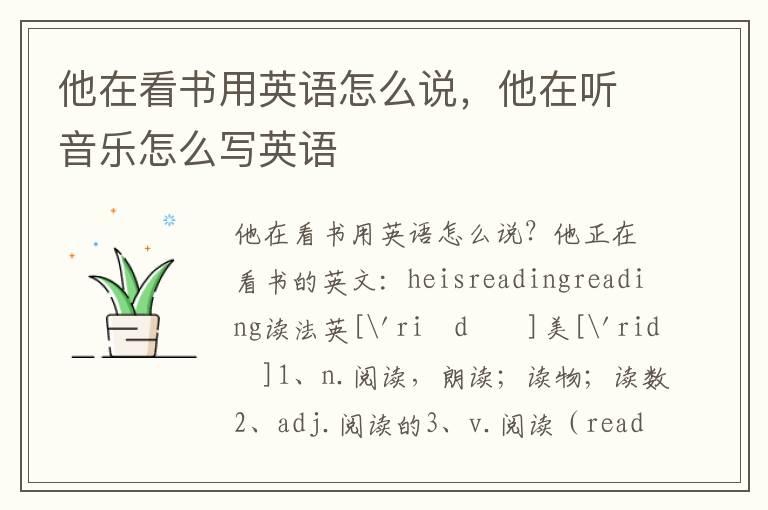【简介】感谢网友“雕龙文库”参与投稿,这里小编给大家分享一些,方便大家学习。
... will + V ...
结构︰主词+will+原形动词+。
说明︰简单未来式由will+动词原形构成。未来式常与下列时间副词片语)连用:tomorrow,tomorrow morning(afternoon,evening),the day after tomorrow,next week,next year,next+星期几,tonight,this evening(afternoon),some day(总有一天),one of these days(近两三天内),How soon?(再过多久?),in+时间,如:in a few days(过几天后),in ten minutes(过十分钟后)。简单未来式还可由be going to+动词原形构成。
We will eat lunch together tomorrow. 我们明天将一起吃午饭。
I will walk home after school this afternoon. 今天下午放学后我将走路回家。
Mr. Lin will wash his motorcycle tomorrow morning. 林先生明天早晨将擦洗他的摩托车。
Will she cook dinner this evening? 她今晚要做晚饭吗?
Will they go on a picnic next week? 他们下星期将去野餐吗?
We will not play basketball tomorrow. 我们明天不打篮球。
David wont go to the movies with Helen next week. 大卫下星期不和海伦一起去看电影。
Your brother is not going to study this evening. 你弟弟今晚不读书。
They will have a lot of fun next month. 他们下个月将玩得很愉快。
School will begin next Tuesday. 下星期二将要开学。
... should/would + V ...
结构︰主词+should(would,may)+原形动词。
说明︰should 是 shall 的过去式,当将要解释,通常用于主词是第一人称 I 或 we;should又当应该解释,表示义务或责任,常用于指现在或未来的事情,主词可用任何人称。 would 是 will 的过去式,当将要解释,通常用于主词是第二人称或第三人称; would 又用于表示愿望would 和 like 连用,表示客气的语气;would 又可用在疑问句中,表示客气的请求。 may 可用于表示可能性或不确定的推测,中文常译为可能,或许,相当于 perhaps或 maybe;may 可用于疑问句表示请求对方允许在否定答句中,may 的否定式可以有两种形式:mustnt 表示强烈的禁止,maynt 表示婉转的禁止。
You should study hard. 你应该努力读书。
He must be sick today. 他今天一定是生病了。
I would like to help you pack. 我想帮忙你捆扎东西。
... will + V ...
结构︰主词+will+原形动词+。
说明︰简单未来式由will+动词原形构成。未来式常与下列时间副词片语)连用:tomorrow,tomorrow morning(afternoon,evening),the day after tomorrow,next week,next year,next+星期几,tonight,this evening(afternoon),some day(总有一天),one of these days(近两三天内),How soon?(再过多久?),in+时间,如:in a few days(过几天后),in ten minutes(过十分钟后)。简单未来式还可由be going to+动词原形构成。
We will eat lunch together tomorrow. 我们明天将一起吃午饭。
I will walk home after school this afternoon. 今天下午放学后我将走路回家。
Mr. Lin will wash his motorcycle tomorrow morning. 林先生明天早晨将擦洗他的摩托车。
Will she cook dinner this evening? 她今晚要做晚饭吗?
Will they go on a picnic next week? 他们下星期将去野餐吗?
We will not play basketball tomorrow. 我们明天不打篮球。
David wont go to the movies with Helen next week. 大卫下星期不和海伦一起去看电影。
Your brother is not going to study this evening. 你弟弟今晚不读书。
They will have a lot of fun next month. 他们下个月将玩得很愉快。
School will begin next Tuesday. 下星期二将要开学。
... should/would + V ...
结构︰主词+should(would,may)+原形动词。
说明︰should 是 shall 的过去式,当将要解释,通常用于主词是第一人称 I 或 we;should又当应该解释,表示义务或责任,常用于指现在或未来的事情,主词可用任何人称。 would 是 will 的过去式,当将要解释,通常用于主词是第二人称或第三人称; would 又用于表示愿望would 和 like 连用,表示客气的语气;would 又可用在疑问句中,表示客气的请求。 may 可用于表示可能性或不确定的推测,中文常译为可能,或许,相当于 perhaps或 maybe;may 可用于疑问句表示请求对方允许在否定答句中,may 的否定式可以有两种形式:mustnt 表示强烈的禁止,maynt 表示婉转的禁止。
You should study hard. 你应该努力读书。
He must be sick today. 他今天一定是生病了。
I would like to help you pack. 我想帮忙你捆扎东西。








